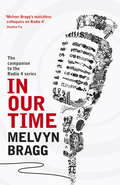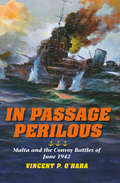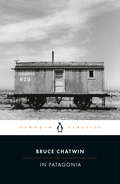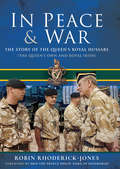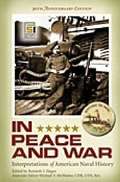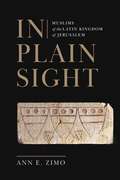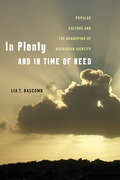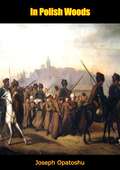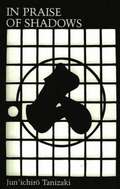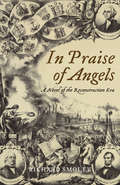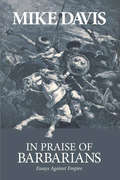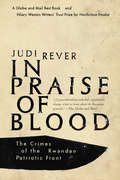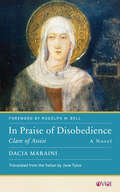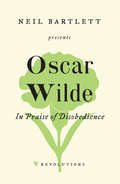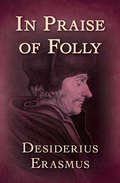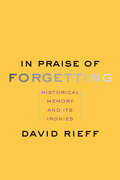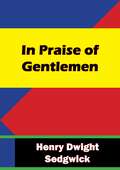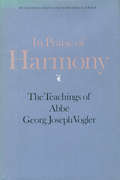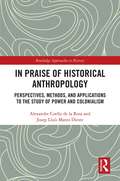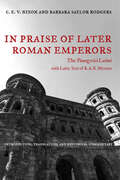- Table View
- List View
In Our Time: The companion to the Radio 4 series
by Melvyn BraggMelvyn Bragg's In Our Time series regularly enlightens and entertains substantial audiences on BBC Radio 4. For this book he has selected episodes which reflect the diversity of the radio programmes, and takes us on an amazing tour through the history of ideas, from philosophy, physics and history to religion, literature and biology. We can discover the reasons for the fall of the Byzantine empire, and why women were persecuted as witches in the seventeenth century. What happened in the peasants' revolt? What shape is the origin of life? Where does our calendar come from? We can unearth the influence of great Islamic thinkers, prime numbers, Socrates and Tectonic plates. Melvyn Bragg orchestrates the ideas of leading academics in each field so that the dynamic and lively discussion from the programmes comes through vividly on the page. In Our Time brings to life the signposts of history, the moments that significantly changed the world as we know it, and the individuals and ideas that made us what we are today.
In Our Time: The companion to the Radio 4 series
by Melvyn BraggMelvyn Bragg's In Our Time series regularly enlightens and entertains substantial audiences on BBC Radio 4. For this book he has selected episodes which reflect the diversity of the radio programmes, and takes us on an amazing tour through the history of ideas, from philosophy, physics and history to religion, literature and biology. We can discover the reasons for the fall of the Byzantine empire, and why women were persecuted as witches in the seventeenth century. What happened in the peasants' revolt? What shape is the origin of life? Where does our calendar come from? We can unearth the influence of great Islamic thinkers, prime numbers, Socrates and Tectonic plates. Melvyn Bragg orchestrates the ideas of leading academics in each field so that the dynamic and lively discussion from the programmes comes through vividly on the page. In Our Time brings to life the signposts of history, the moments that significantly changed the world as we know it, and the individuals and ideas that made us what we are today.
In Our Time: The companion to the Radio 4 series
by Melvyn BraggMelvyn Bragg's In Our Time series regularly entertains and fascinates substantial audiences on BBC Radio 4. For this book he has selected episodes which reflect the diversity of the radio programmes, and take us on an amazing tour through the history of ideas, from philosophy, science and history to politics, literature and art.We can discover the reasons for the fall of the Byzantine empire, and why women were persecuted as witches in the seventeenth century. What happened in the peasant's revolt? What is the real American West behind the glamour of Hollywood films? What shape is the universe? Where does our calendar come from?Melvyn Bragg orchestrates the ideas of leading experts in each field leading to dynamic and lively discussion. In Our Time brings to life the flashpoints of history, the moments that fundamentally changed the world as we know it, and the individuals and ideas that made us what we are today.(P)2009 Hodder & Stoughton
In Passage Perilous: Malta and the Convoy Battles of June 1942 (Twentieth-Century Battles)
by Vincent P. O'HaraAn invaluable account of one of the most overlooked sea battles of World War II. By mid-1942 the Allies were losing the Mediterranean war: Malta was isolated and its civilian population faced starvation. In June 1942 the British Royal Navy made a stupendous effort to break the Axis stranglehold. The British dispatched armed convoys from Gibraltar and Egypt toward Malta. In a complex battle lasting more than a week, Italian and German forces defeated Operation Vigorous, the larger eastern effort, and ravaged the western convoy, Operation Harpoon, in a series of air, submarine, and surface attacks culminating in the Battle of Pantelleria. Just two of seventeen merchant ships that set out for Malta reached their destination. In Passage Perilous presents a detailed description of the operations and assesses the actual impact Malta had on the fight to deny supplies to Rommel&’s army in North Africa. The book&’s discussion of the battle&’s operational aspects highlights the complex relationships between air and naval power and the influence of geography on littoral operations. &“An important and highly recommended addition to the literature on World War II in the Mediterranean.&” —IPP Naval Maritime History
In Patagonia: Travels In Patagonia (Virago Modern Classics)
by Bruce ChatwinThe masterpiece of travel writing that revolutionized the genre and made its author famous overnight An exhilarating look at a place that still retains the exotic mystery of a far-off, unseen land, Bruce Chatwin's exquisite account of his journey through Patagonia teems with evocative descriptions, remarkable bits of history, and unforgettable anecdotes. Fueled by an unmistakable lust for life and adventure and a singular gift for storytelling, Chatwin treks through "the uttermost part of the earth"--that stretch of land at the southern tip of South America, where bandits were once made welcome--in search of almost-forgotten legends, the descendants of Welsh immigrants, and the log cabin built by Butch Cassidy. An instant classic upon publication in 1977, In Patagonia is a masterpiece that has cast a long shadow upon the literary world.For more than seventy years, Penguin has been the leading publisher of classic literature in the English-speaking world. With more than 1,700 titles, Penguin Classics represents a global bookshelf of the best works throughout history and across genres and disciplines. Readers trust the series to provide authoritative texts enhanced by introductions and notes by distinguished scholars and contemporary authors, as well as up-to-date translations by award-winning translators.From the Trade Paperback edition.
In Peace & War: The Story of The Queen's Royal Hussars (The Queen's Own and Royal Irish)
by Robin Rhoderick-JonesA British military veteran presents an insider&’s history of the UK&’s elite armored regiment across three centuries of service—&“highly recommended&” (Military Historical Society). Formed in 1993, the Queen&’s Royal Hussars trace their origins back to 1685 when King James II formed a standing army. An amalgamation of two former regiments—the Queen&’s Own Hussars and the Queen&’s Royal Irish Hussars—the QRH carry on the distinguished history of their antecedents. A veteran of both the Queen&’s Own and the Queen&’s Royal Irish, Robin Rhoderick-Jones tells the history of these celebrated regiments who fought alongside each other at Dettingen, Balaklava, the Peninsula, in India and during the two World Wars. Recently the QRH have seen action in Bosnia-Herzegovina, Kosovo, Iraq and Afghanistan where they provided the first cavalry-led ground-holding battlegroup. In Peace and War is a superbly researched record of the QRH through more than 300 years&’ distinguished service to the Crown. While the demands facing the QRH have changed over the years, their dedication, bravery, commitment and sense of humor remain constant.
In Peace and War: Interpretations of American Naval History
by Kenneth J. Hagan Michael T. McmasterThe American version of naval history adds a certain trajectory that does not run straight from a few gunboats to glory but runs parallel to the winding path to power of the country itself. This edition of the 1978 classic reflects that path, and includes newly-created works that provide new insights into what we now know about the early and mid-twentieth century, the Cold War and recent strategy. Both classic and new works cover the navies of the American Revolution, the role of the Navy in the War of 1812, the commercial value of the 1815-1844 Navy and its work, for the Union and the Confederacy, the Navy of growing international power, its participation in the great wars, and its course through diplomacy as one century became another. This is accessible enough to serve as a course reader as well as a reference. Annotation ©2008 Book News, Inc. , Portland, OR (booknews. com)
In Pharaoh's Army: Memories of the Lost War
by Tobias WolffWhether he is evoking the blind carnage of the Tet offensive, the theatrics of his fellow Americans, or the unraveling of his own illusions, Wolff brings to this work the same uncanny eye for detail, pitiless candor and mordant wit that made "This Boy's Life" a modern classic.
In Place: Spatial And Social Order In A Faeroe Island Community
by Dennis GaffinAs one of the Scandinavian nations, the Faeroe Islands can prove instructive to the study of regionalism and multi-ethnicity in European culture areas. In this first published ethnography about the people of the Faeroe Islands, Gaffin focuses on ecology and "place." Having settled in for a year of fieldwork in 1983, he and his wife became part of the friendly and public lives of this remote setting, with its natural beauty and its honorable and egalitarian social traditions. In repeat visits he learns more and more of the places and the people whose very names come from these hard cliffs and shallow soil, these long centuries of singing and cooperating, the wry wit and the understated social codes. Relatively unknown to Western society, the Faeroe Islands provide an important case study in the contemporary combination of traditional home-based subsistence techniques such as fowling, whaling, and shepherding with a modern international commercial fishing economy.
In Plain Sight: Muslims of the Latin Kingdom of Jerusalem (The Middle Ages Series)
by Ann E. ZimoHow Muslims integrated themselves into the Kingdom of Jerusalem, founded in the wake of the First CrusadeIn Plain Sight draws from a wide array of interdisciplinary sources to show how Muslims, seemingly hostile to the entire crusading enterprise, integrated themselves into the kingdom founded in the wake of the First Crusade. The book examines how Muslims, whether Sunni or Shi‘a or Druze, fit into society in the crusader Kingdom of Jerusalem, uncovering the daily reality of their experience. Exploring how and to what extent Muslims interacted with the Frankish ruling elite, historian Ann E. Zimo presents a new vantage point from which to reconsider the popularly accepted notion that the crusades, and by extension the crusader states, were a locus of a monolithic clash between West and East or between Christianity and Islam. By untangling the relations between the Muslim communities and their rulers, Zimo offers a more fully realized image of a society too multifaceted to be reasonably reduced to a black-and-white binary opposition.Zimo not only re-reads the well-known Frankish sources, including narrative chronicles, letters, charters, and legal treatises, but combines them with an investigation of the Arabic documentary base, including chronicles, biographies, fatwa literature, pilgrimage guides, and treaties which are not translated and largely inaccessible to most historians of the crusades. She also draws from the enormous and growing body of scholarship generated by archaeologists whose work can often provide insights into the aspects of the past not recorded in the historical record. By casting such a wide evidentiary net, In Plain Sight sheds new light on Frankish society and how Muslims fit into it, offering major revisions to the current conception of population distribution within the kingdom and the nature of the Frankish polity itself.
In Plenty and in Time of Need: Popular Culture and the Remapping of Barbadian Identity (Critical Caribbean Studies)
by Lia T. BascombIn Plenty and in Time of Need demonstrates how the unique history of Barbados has contributed to complex relations of national, gendered, and sexual identities, and how these identities are represented and interpreted on a global stage. As the most widespread manifestation of social commentary, the book uses music and performance to analyze the competing ideals and realities of the national culture. It details the histories of prominent musical artists, including the prolific Pan-Africanist calypsonian the Mighty Gabby, the world-renowned Merrymen, Soca Queen Alison Hinds, artist/activist Rupee, and international superstar Rihanna. Using these artists, the project analyzes how femininity, masculinity, and sexuality are put in service of Barbadian nationalism. By examining websites, blogs, and digital products of these artists in conversation with Barbadian tourism, the book re-examines the ways in which commodity, sexuality, gender performance, and diasporic consciousness undergird individual careers and national representations.
In Polish Woods
by Joseph Opatoshu Isaac GoldbergIn Polish Woods, which was first published in its English translation from its original Yiddish in 1938, is a historical novel describing the devolution of the Kotzker dynasty between the age of Napoleon and the Polish Revolt of 1863.Author Joseph Opatoshu reflects on the conflicting and even opposite tendencies in development of the Jewish ideology during this era, which would largely determine the future of the Jewish people: Hasidism, enlightenment, and assimilation.A thoroughly engaging read.
In Praise Of Shadows
by Edward G. Seidensticker Charles Moore Jun'Ichirō Tanizaki Thomas J. HarperAn essay on aesthetics by the Japanese novelist, this book explores architecture, jade, food, and even toilets, combining an acute sense of the use of space in buildings. The book also includes descriptions of laquerware under candlelight and women in the darkness of the house of pleasure. This was originally written in 1933, between World Wars I and II. The changes in Japan after WWII make this a period piece. This translation has won a major translation award.
In Praise of Angels: A Novel of the Reconstruction Era
by Richard SmolevThe years after the Civil War were marked by bitter political fights betwen the Democrats and Radical Republicans over how to reunite the country, and a deeply divided group of newspapers shouting down their opponents. All claimed to be acting on behalf of the better angels of our nature that Lincoln said should guide us as a people. Meanwhile, Washington was flooded with lobbyists spreading cash to buy influence and votes, and America's West was being opened by the construction of the transcontinental railroad. As a reporter for a Philadelphia newspaper, Benjamin Wright has a front-row seat to this period of transition in our history. He not only covers the impeachment trial of Andrew Johnson, which was sparked by disagreements over how to bring the Confederate states back to the Union, but then initiates investigation into the massive theft of government monies by the company building the railroad. His reporting both puts Benjamin into the middle of Horace Greeley's 1872 Presidential campaign and makes him the principal voice covering the Congressional hearings into what became known as the Credit Mobilier scandal. As dizzying as these experiences are, however, they come at an enormous personal cost. And, like so many of us who today are fed up with the intransigence of our elected officials and the media's relentless fanning of the partisan flames, Benjamin's disappointment with both the government and the newspaper business escalates the more closely he witnesses Washington's corrupt soul and the bias of the press.
In Praise of Barbarians: Essays Against Empire
by Mike DavisThe social critic and Set the Night on Fire co-author tackles the fashion for empires and white men’s burdens in this 2007 collection of radical essays.With In Praise of Barbarians, Mike Davis skewers contemporary idols such as Mel Gibson, Niall Ferguson, and Howard Dean; unlocks some secret doors in the Pentagon and the California prison system; visits Star Wars in the Arctic and vigilantes on the border; predicts ethnic cleansing in New Orleans more than a year before Katrina; recalls the anarchist avengers of the 1890s and “teeny-bopper” riots on the Sunset Strip in the 1960s; discusses the moral bankruptcy of the Democrats in Kansas and West Virginia; remembers “Private Ivan,” who defeated fascism; and looks at the future of capitalism from the top of Hubbert’s Peak.No writer in the United States today brings together analysis and history as comprehensively and elegantly as Mike Davis. In these contemporary, interventionist essays, Davis goes beyond critique to offer real solutions and concrete possibilities for change.Praise for Mike Davis“Davis remains our penman of lost souls and lost scenarios: He culls nuggets of avarice and depredation the way miners chisel coal.” —The Nation“A rare combination of an author, Rachel Carson and Upton Sinclair all in one.” —Susan Faludi, author of Backlash“Davis’ work is the cruel and perpetual folly of the ruling elites.” —New York Times
In Praise of Blood: The Crimes Of The Rwandan Patriotic Front
by Judi ReverA stunning work of investigative reporting by a Canadian journalist who has risked her own life to bring us a deeply disturbing history of the Rwandan genocide that takes the true measure of Rwandan head of state Paul Kagame.Through unparalleled interviews with RPF defectors, former soldiers and atrocity survivors, supported by documents leaked from a UN court, Judi Rever brings us the complete history of the Rwandan genocide. Considered by the international community to be the saviours who ended the Hutu slaughter of innocent Tutsis, Kagame and his rebel forces were also killing, in quiet and in the dark, as ruthlessly as the Hutu genocidaire were killing in daylight. The reason why the larger world community hasn't recognized this truth? Kagame and his top commanders effectively covered their tracks and, post-genocide, rallied world guilt and played the heroes in order to attract funds to rebuild Rwanda and to maintain and extend the Tutsi sphere of influence in the region. Judi Rever, who has followed the story since 1997, has marshalled irrefutable evidence to show that Kagame's own troops shot down the presidential plane on April 6, 1994--the act that put the match to the genocidal flame. And she proves, without a shadow of doubt, that as Kagame and his forces slowly advanced on the capital of Kigali, they were ethnically cleansing the country of Hutu men, women and children in order that returning Tutsi settlers, displaced since the early '60s, would have homes and land. This book is heartbreaking, chilling and necessary.
In Praise of Disobedience: Clare of Assisi, A Novel (Other Voices of Italy)
by Dacia MarainiAn author receives a mysterious e-mail begging her to tell the story of Clare of Assisi, the thirteenth-century Italian saint. At first annoyed by the request, the author begins to research Saint Clare and becomes captivated by her life. We too are transported into the strange and beautiful world of medieval Italy, witnessing the daily rituals of convent life. At the center of that life is Saint Clare, a subversive and compelling figure full of contradictions: a physically disabled woman who travels widely in her imagination, someone unforgivingly harsh to herself yet infinitely generous to the women she supervises, a practitioner of self-abnegation who nevertheless knows her own worth. A visionary who liberated herself from the chains of materialism and patriarchy, Saint Clare here becomes an inspirational figure for a new generation of readers.
In Praise of Disobedience: The Soul of Man Under Socialism and Other Works
by Oscar Wilde Neil BartlettWorks of Wilde's annus mirabilis of 1891 in one volume, with an introduction by renowned British playwright.The Soul of Man Under Socialism draw on works from a single miraculous year in which Oscar Wilde published the larger part of his greatest works in prose -- the year he came into maturity as an artist. Before the end of 1891, he had written the first of his phenomenally successful plays and met the young man who would win his heart, beginning the love affair that would lead to imprisonment and public infamy.In a witty introduction, playwright, novelist and Wilde scholar Neil Bartlett explains what made this point in the writer's life central to his genius and why Wilde remains a provocative and radical figure to this day.Included here are the entirety of Wilde's foray into political philosophy, The Soul of Man Under Socialism; the complete essay collection Intentions; selections from The Portrait of Dorian Gray as well as its paradoxical and scandalous preface; and some of Wilde's greatest fictions for children. Each selection is accompanied by stimulating and enlightening annotations. A delight for fans of Oscar Wilde, In Praise of Disobedience will revitalize an often misunderstood legacy.
In Praise of Folly: With Illustrations After Hans Holbein, And A Portrait, Together With A Life Of Erasmus And His Epistle Addressed To Sir Thomas Mor
by Desiderius ErasmusThis sixteenth-century religious satire by a Renaissance critic and theologian is &“a masterpiece of humor and wise irony&” (Johan Huizinga, Dutch historian). At the onset of his hugely successful satire of medieval European society, Dutch scholar Desiderius Erasmus invokes the goddess Folly, daughter of Youth and Wealth, who was raised by Drunkenness and Ignorance. She&’s followed by idolatrous companions, including Self-love, Flattery, Pleasure, and Laziness. Through Folly&’s wry and humorous speech, Erasmus denounces the superstitions and nonsensical eccentricities of his contemporary theologians and churchmen, monastic life, and the condition of the Catholic Church. An immensely influential humanist text, In Praise of Folly helped lay the groundwork for the Protestant Reformation and marked a transitional time between medieval beliefs and modern ideals.
In Praise of Folly: With Portrait, Life Of Erasmus, And His Epistle To Sir Thomas More (1922) (Dover Thrift Editions: Philosophy)
by Desiderius ErasmusThis witty, influential work by one of the greatest scholars of the Renaissance satirizes the shortcomings of the upper classes and religious institutions of the time. The most effective of all Erasmus's writings -- ripe with allusions, vignettes, and caricatures -- the literary gem was not only an extremely intelligent and articulate response to pretentiousness of all sorts, it also proved to be spiritual dynamite, leaving monastic brothers and clergymen the objects of universal laughter.The book's purported narrator, the goddess Folly, proclaims herself to be the daughter of Youth and Wealth, nursed by Drunkenness and Ignorance. She is accompanied by such followers as Self-love, Pleasure, Flattery, and Sound Sleep.A clever mix of drollery and fantasy, fast-paced and lighthearted in tone, the work has proved to be a lively and valuable commentary on modern times. It remains, according to the great Dutch historian John Huizinga, "a masterpiece of humour and wise irony ... something that no one else could have given to the world."
In Praise of Forgetting: Historical Memory and Its Ironies
by David RieffThe conventional wisdom about historical memory is summed up in George Santayana's celebrated phrase, "Those who cannot remember the past are condemned to repeat it. " Today, the consensus that it is moral to remember, immoral to forget, is nearly absolute. And yet is this right? David Rieff, an independent writer who has reported on bloody conflicts in Africa, the Balkans, and Central Asia, insists that things are not so simple. He poses hard questions about whether remembrance ever truly has, or indeed ever could, "inoculate" the present against repeating the crimes of the past. He argues that rubbing raw historical wounds--whether self-inflicted or imposed by outside forces--neither remedies injustice nor confers reconciliation. If he is right, then historical memory is not a moral imperative but rather a moral option--sometimes called for, sometimes not. Collective remembrance can be toxic. Sometimes, Rieff concludes, it may be more moral to forget. Ranging widely across some of the defining conflicts of modern times--the Irish Troubles and the Easter Uprising of 1916, the white settlement of Australia, the American Civil War, the Balkan wars, the Holocaust, and 9/11--Rieff presents a pellucid examination of the uses and abuses of historical memory. His contentious, brilliant, and elegant essay is an indispensable work of moral philosophy.
In Praise of Gentlemen
by Henry Dwight SedgwickIT is the thesis of this charmingly written book that with the passing of the idea of being a gentleman purely for the sake of being a gentleman something worthwhile has been lost to civilization. Neither democracies nor dictatorships are friendly to the gentleman.-NYTimes.“IT is over a hundred years since the last of the Waverley Novels was written, and the mere name of those famous books, which swept down from Edinburgh over England, France, Germany, and Italy, and stirred their generation to wild enthusiasm, helps us to realize the revolution that has metamorphosed social ideas and usages since then. Some of these novels still maintain a foremost place in English literature, and yet the present generation holds them cheap; it reads Rob Roy and The Heart of Midlothian, if at all, as monuments in literary history. And this is due less to a change in literary taste than to the revolution in social usages and ideas. The young generation derides Scott’s admiration for high rank in the social hierarchy as snobbery, it calls his loyalties prejudices, it denounces his moral delicacy as puritanical prudery; it measures them by its own standards, its own usages, its own ideas, and finds them wanting. It would be idle to speculate whether their standards or those of Sir Walter are more conducive to general happiness. In any event, the change is historically interesting and has its place in the story of civilization.”-Introduction.
In Praise of Harmony: The Teachings of Abbé Georg Joseph Vogler
by Floyd K. Grave Margaret G. GraveIn Praise of Harmony is the first critical and biographical study of Vogler to appear in English.
In Praise of Historical Anthropology: Perspectives, Methods, and Applications to the Study of Power and Colonialism (Routledge Approaches to History #35)
by Alexandre Coello de la Rosa Josep Lluís Mateo DiesteIn Praise of Historical Anthropology is based on a fundamental conviction: the study of society cannot be undertaken without considering the weight of history and separations between disciplines in academics need to be bridged for the benefit of knowledge. Anthropology cannot be limited to situating its object in its immediate context; rather its true subject of study is society as a historical problem. The book describes the complex attempts to transcend this separation, presenting perspectives, methodologies and direct applications for the study of power relations and systems of social classification, paying special attention to the reconstruction of colonial situations. Following the maxim expounded by John and Jean Comaroff, this book will help us understand that historical anthropology is not a matter of merging the two disciplines of anthropology and history, but rather considering societies in their historically situated dimension and applying the tools of the social and human sciences to the analysis. In this vein, the book reviews the complex attempts to bridge disciplinary separations and theoretical proposals coming from very different traditions. The text, consequently, opens up hegemonic perspectives to include 'other anthropologies.'
In Praise of Later Roman Emperors: The Panegyrici Latini (Transformation of the Classical Heritage #21)
by C. E. Nixon Barbara Saylor RodgersHere, for the first time, is an annotated English translation of the eleven later panegyrics (291-389 C.E.) of the XII Panegyrici Latini, with the original Latin text prepared by R. A. B. Mynors. Each panegyric has a thorough introduction, and detailed commentary on historical events, style, figures of speech, and rhetorical strategies accompanies the translations. The very difficult Latin of these insightful speeches is rendered into graceful English, yet remains faithful to the original.
